Business Law Assignment: Business Law in the UK - Key Concepts
VerifiedAdded on 2020/06/03
|15
|5457
|208
Homework Assignment
AI Summary
This business law assignment provides a comprehensive overview of several key areas within UK business law. It begins by examining legal rules on implied terms in the sale of goods and services, outlining statutory requirements and remedies for both sellers and buyers. The assignment then delves into different types of credit agreements, the rules surrounding termination and default notices, and the roles of agents. Further, it explores the legal aspects of monopolies and anti-competitive practices within the UK and EU markets, including the role of the Competition Commission and exemptions for anti-competitive practices. Finally, the assignment addresses intellectual property, covering different forms, principles of protection for inventions and copyright, and the distinctions between trademarks and business names. The assignment incorporates case studies and examples to illustrate the practical application of these legal principles.
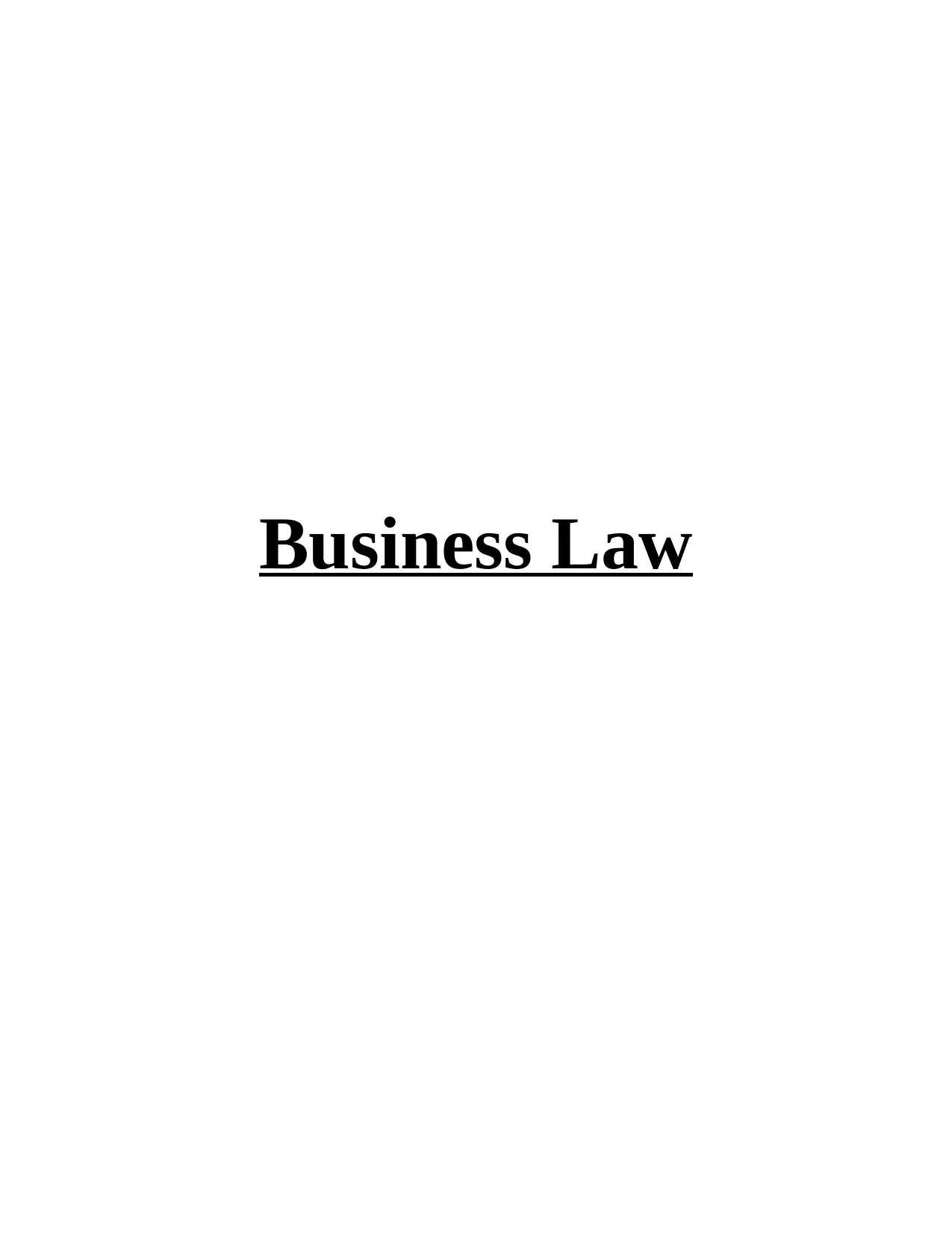
Business Law
Paraphrase This Document
Need a fresh take? Get an instant paraphrase of this document with our AI Paraphraser
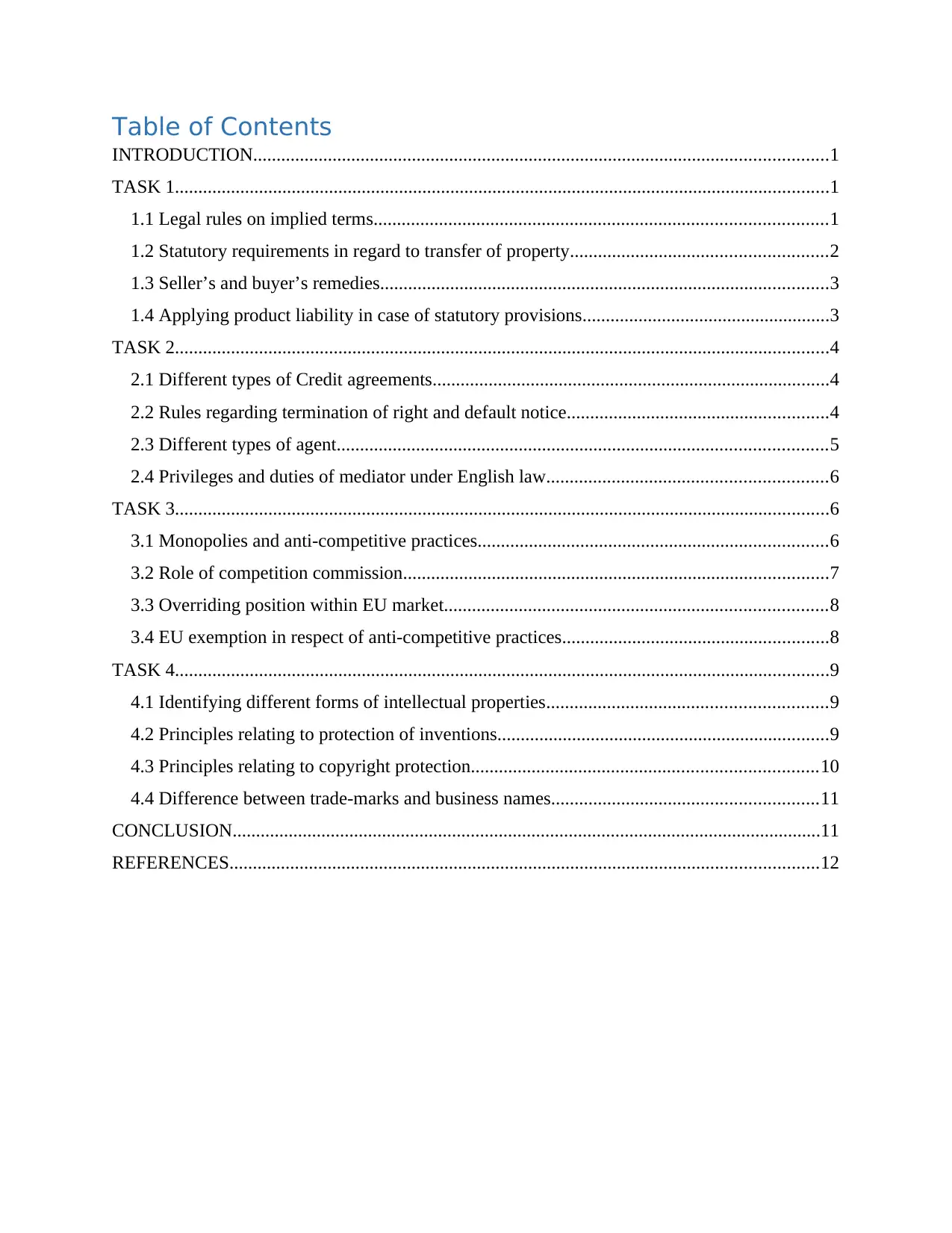
Table of Contents
INTRODUCTION...........................................................................................................................1
TASK 1............................................................................................................................................1
1.1 Legal rules on implied terms.................................................................................................1
1.2 Statutory requirements in regard to transfer of property.......................................................2
1.3 Seller’s and buyer’s remedies................................................................................................3
1.4 Applying product liability in case of statutory provisions.....................................................3
TASK 2............................................................................................................................................4
2.1 Different types of Credit agreements.....................................................................................4
2.2 Rules regarding termination of right and default notice........................................................4
2.3 Different types of agent.........................................................................................................5
2.4 Privileges and duties of mediator under English law............................................................6
TASK 3............................................................................................................................................6
3.1 Monopolies and anti-competitive practices...........................................................................6
3.2 Role of competition commission...........................................................................................7
3.3 Overriding position within EU market..................................................................................8
3.4 EU exemption in respect of anti-competitive practices.........................................................8
TASK 4............................................................................................................................................9
4.1 Identifying different forms of intellectual properties............................................................9
4.2 Principles relating to protection of inventions.......................................................................9
4.3 Principles relating to copyright protection..........................................................................10
4.4 Difference between trade-marks and business names.........................................................11
CONCLUSION..............................................................................................................................11
REFERENCES..............................................................................................................................12
INTRODUCTION...........................................................................................................................1
TASK 1............................................................................................................................................1
1.1 Legal rules on implied terms.................................................................................................1
1.2 Statutory requirements in regard to transfer of property.......................................................2
1.3 Seller’s and buyer’s remedies................................................................................................3
1.4 Applying product liability in case of statutory provisions.....................................................3
TASK 2............................................................................................................................................4
2.1 Different types of Credit agreements.....................................................................................4
2.2 Rules regarding termination of right and default notice........................................................4
2.3 Different types of agent.........................................................................................................5
2.4 Privileges and duties of mediator under English law............................................................6
TASK 3............................................................................................................................................6
3.1 Monopolies and anti-competitive practices...........................................................................6
3.2 Role of competition commission...........................................................................................7
3.3 Overriding position within EU market..................................................................................8
3.4 EU exemption in respect of anti-competitive practices.........................................................8
TASK 4............................................................................................................................................9
4.1 Identifying different forms of intellectual properties............................................................9
4.2 Principles relating to protection of inventions.......................................................................9
4.3 Principles relating to copyright protection..........................................................................10
4.4 Difference between trade-marks and business names.........................................................11
CONCLUSION..............................................................................................................................11
REFERENCES..............................................................................................................................12
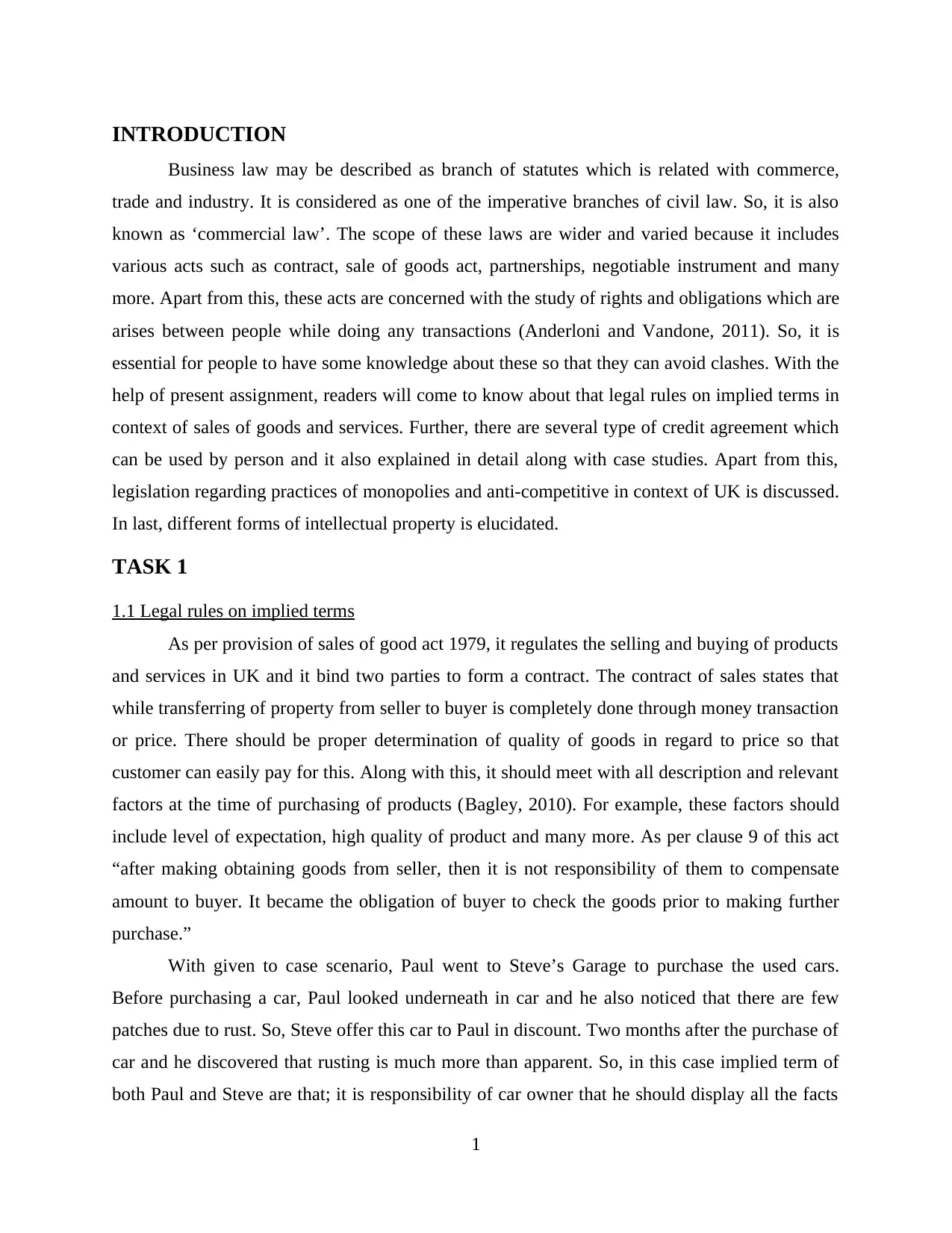
INTRODUCTION
Business law may be described as branch of statutes which is related with commerce,
trade and industry. It is considered as one of the imperative branches of civil law. So, it is also
known as ‘commercial law’. The scope of these laws are wider and varied because it includes
various acts such as contract, sale of goods act, partnerships, negotiable instrument and many
more. Apart from this, these acts are concerned with the study of rights and obligations which are
arises between people while doing any transactions (Anderloni and Vandone, 2011). So, it is
essential for people to have some knowledge about these so that they can avoid clashes. With the
help of present assignment, readers will come to know about that legal rules on implied terms in
context of sales of goods and services. Further, there are several type of credit agreement which
can be used by person and it also explained in detail along with case studies. Apart from this,
legislation regarding practices of monopolies and anti-competitive in context of UK is discussed.
In last, different forms of intellectual property is elucidated.
TASK 1
1.1 Legal rules on implied terms
As per provision of sales of good act 1979, it regulates the selling and buying of products
and services in UK and it bind two parties to form a contract. The contract of sales states that
while transferring of property from seller to buyer is completely done through money transaction
or price. There should be proper determination of quality of goods in regard to price so that
customer can easily pay for this. Along with this, it should meet with all description and relevant
factors at the time of purchasing of products (Bagley, 2010). For example, these factors should
include level of expectation, high quality of product and many more. As per clause 9 of this act
“after making obtaining goods from seller, then it is not responsibility of them to compensate
amount to buyer. It became the obligation of buyer to check the goods prior to making further
purchase.”
With given to case scenario, Paul went to Steve’s Garage to purchase the used cars.
Before purchasing a car, Paul looked underneath in car and he also noticed that there are few
patches due to rust. So, Steve offer this car to Paul in discount. Two months after the purchase of
car and he discovered that rusting is much more than apparent. So, in this case implied term of
both Paul and Steve are that; it is responsibility of car owner that he should display all the facts
1
Business law may be described as branch of statutes which is related with commerce,
trade and industry. It is considered as one of the imperative branches of civil law. So, it is also
known as ‘commercial law’. The scope of these laws are wider and varied because it includes
various acts such as contract, sale of goods act, partnerships, negotiable instrument and many
more. Apart from this, these acts are concerned with the study of rights and obligations which are
arises between people while doing any transactions (Anderloni and Vandone, 2011). So, it is
essential for people to have some knowledge about these so that they can avoid clashes. With the
help of present assignment, readers will come to know about that legal rules on implied terms in
context of sales of goods and services. Further, there are several type of credit agreement which
can be used by person and it also explained in detail along with case studies. Apart from this,
legislation regarding practices of monopolies and anti-competitive in context of UK is discussed.
In last, different forms of intellectual property is elucidated.
TASK 1
1.1 Legal rules on implied terms
As per provision of sales of good act 1979, it regulates the selling and buying of products
and services in UK and it bind two parties to form a contract. The contract of sales states that
while transferring of property from seller to buyer is completely done through money transaction
or price. There should be proper determination of quality of goods in regard to price so that
customer can easily pay for this. Along with this, it should meet with all description and relevant
factors at the time of purchasing of products (Bagley, 2010). For example, these factors should
include level of expectation, high quality of product and many more. As per clause 9 of this act
“after making obtaining goods from seller, then it is not responsibility of them to compensate
amount to buyer. It became the obligation of buyer to check the goods prior to making further
purchase.”
With given to case scenario, Paul went to Steve’s Garage to purchase the used cars.
Before purchasing a car, Paul looked underneath in car and he also noticed that there are few
patches due to rust. So, Steve offer this car to Paul in discount. Two months after the purchase of
car and he discovered that rusting is much more than apparent. So, in this case implied term of
both Paul and Steve are that; it is responsibility of car owner that he should display all the facts
1
⊘ This is a preview!⊘
Do you want full access?
Subscribe today to unlock all pages.

Trusted by 1+ million students worldwide
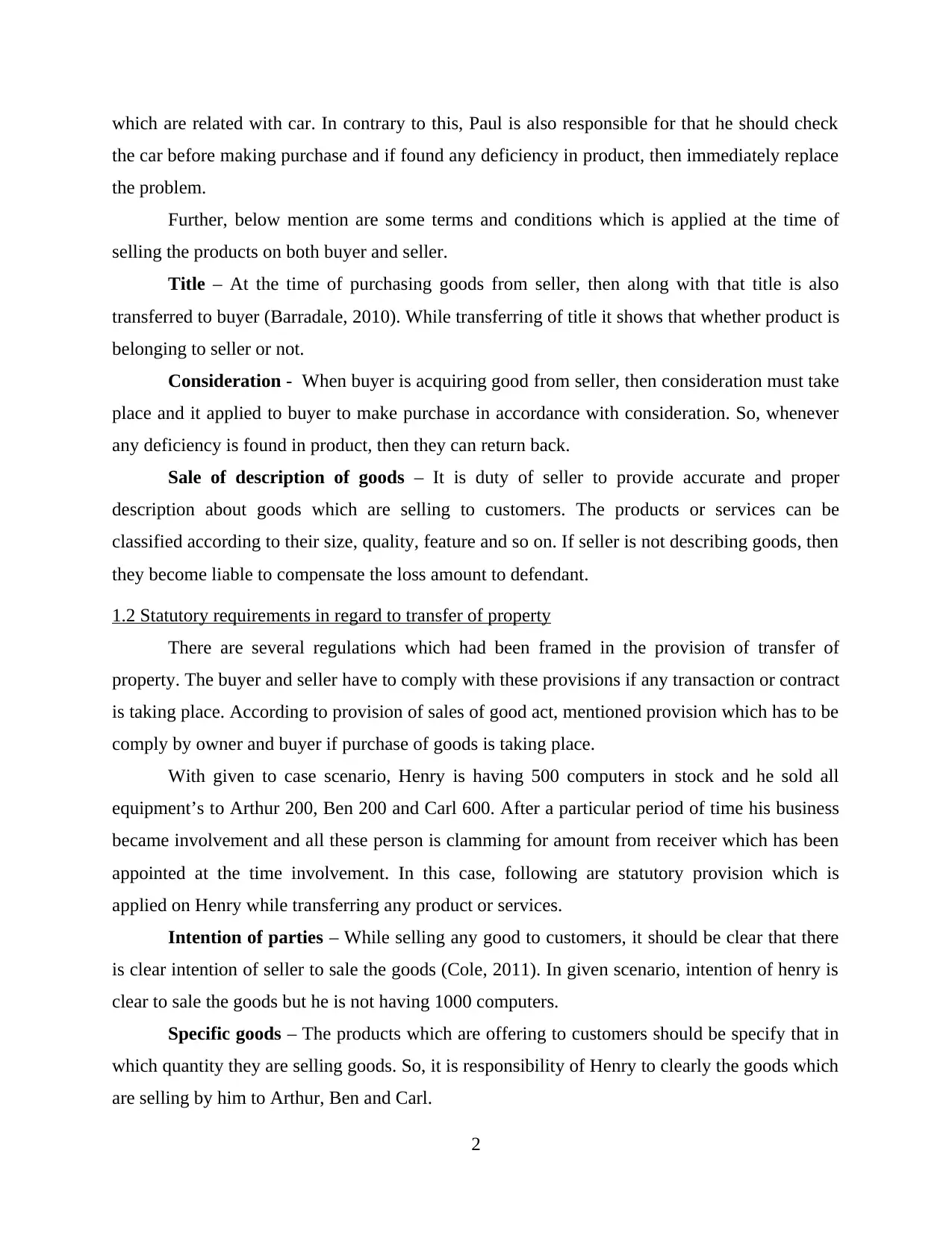
which are related with car. In contrary to this, Paul is also responsible for that he should check
the car before making purchase and if found any deficiency in product, then immediately replace
the problem.
Further, below mention are some terms and conditions which is applied at the time of
selling the products on both buyer and seller.
Title – At the time of purchasing goods from seller, then along with that title is also
transferred to buyer (Barradale, 2010). While transferring of title it shows that whether product is
belonging to seller or not.
Consideration - When buyer is acquiring good from seller, then consideration must take
place and it applied to buyer to make purchase in accordance with consideration. So, whenever
any deficiency is found in product, then they can return back.
Sale of description of goods – It is duty of seller to provide accurate and proper
description about goods which are selling to customers. The products or services can be
classified according to their size, quality, feature and so on. If seller is not describing goods, then
they become liable to compensate the loss amount to defendant.
1.2 Statutory requirements in regard to transfer of property
There are several regulations which had been framed in the provision of transfer of
property. The buyer and seller have to comply with these provisions if any transaction or contract
is taking place. According to provision of sales of good act, mentioned provision which has to be
comply by owner and buyer if purchase of goods is taking place.
With given to case scenario, Henry is having 500 computers in stock and he sold all
equipment’s to Arthur 200, Ben 200 and Carl 600. After a particular period of time his business
became involvement and all these person is clamming for amount from receiver which has been
appointed at the time involvement. In this case, following are statutory provision which is
applied on Henry while transferring any product or services.
Intention of parties – While selling any good to customers, it should be clear that there
is clear intention of seller to sale the goods (Cole, 2011). In given scenario, intention of henry is
clear to sale the goods but he is not having 1000 computers.
Specific goods – The products which are offering to customers should be specify that in
which quantity they are selling goods. So, it is responsibility of Henry to clearly the goods which
are selling by him to Arthur, Ben and Carl.
2
the car before making purchase and if found any deficiency in product, then immediately replace
the problem.
Further, below mention are some terms and conditions which is applied at the time of
selling the products on both buyer and seller.
Title – At the time of purchasing goods from seller, then along with that title is also
transferred to buyer (Barradale, 2010). While transferring of title it shows that whether product is
belonging to seller or not.
Consideration - When buyer is acquiring good from seller, then consideration must take
place and it applied to buyer to make purchase in accordance with consideration. So, whenever
any deficiency is found in product, then they can return back.
Sale of description of goods – It is duty of seller to provide accurate and proper
description about goods which are selling to customers. The products or services can be
classified according to their size, quality, feature and so on. If seller is not describing goods, then
they become liable to compensate the loss amount to defendant.
1.2 Statutory requirements in regard to transfer of property
There are several regulations which had been framed in the provision of transfer of
property. The buyer and seller have to comply with these provisions if any transaction or contract
is taking place. According to provision of sales of good act, mentioned provision which has to be
comply by owner and buyer if purchase of goods is taking place.
With given to case scenario, Henry is having 500 computers in stock and he sold all
equipment’s to Arthur 200, Ben 200 and Carl 600. After a particular period of time his business
became involvement and all these person is clamming for amount from receiver which has been
appointed at the time involvement. In this case, following are statutory provision which is
applied on Henry while transferring any product or services.
Intention of parties – While selling any good to customers, it should be clear that there
is clear intention of seller to sale the goods (Cole, 2011). In given scenario, intention of henry is
clear to sale the goods but he is not having 1000 computers.
Specific goods – The products which are offering to customers should be specify that in
which quantity they are selling goods. So, it is responsibility of Henry to clearly the goods which
are selling by him to Arthur, Ben and Carl.
2
Paraphrase This Document
Need a fresh take? Get an instant paraphrase of this document with our AI Paraphraser
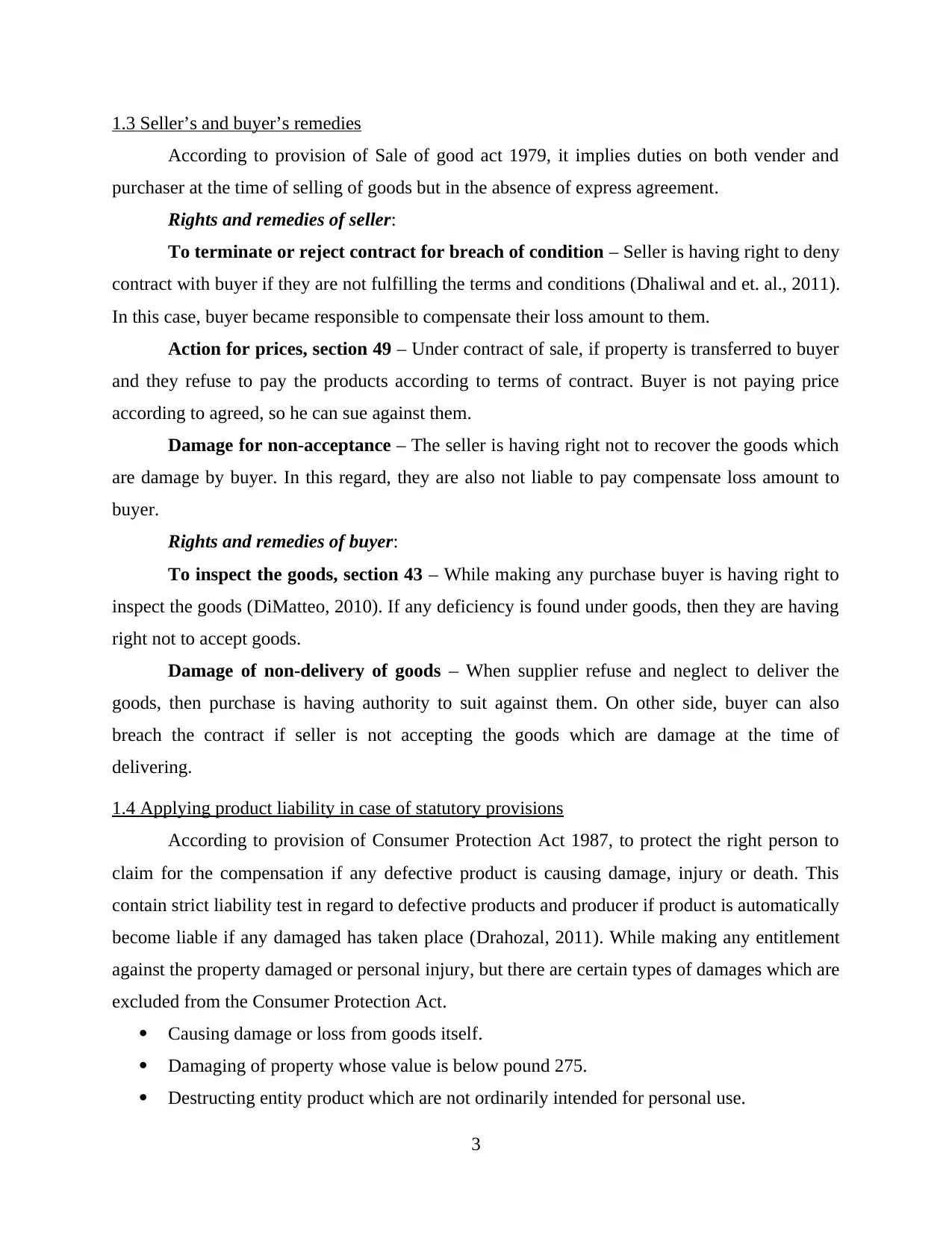
1.3 Seller’s and buyer’s remedies
According to provision of Sale of good act 1979, it implies duties on both vender and
purchaser at the time of selling of goods but in the absence of express agreement.
Rights and remedies of seller:
To terminate or reject contract for breach of condition – Seller is having right to deny
contract with buyer if they are not fulfilling the terms and conditions (Dhaliwal and et. al., 2011).
In this case, buyer became responsible to compensate their loss amount to them.
Action for prices, section 49 – Under contract of sale, if property is transferred to buyer
and they refuse to pay the products according to terms of contract. Buyer is not paying price
according to agreed, so he can sue against them.
Damage for non-acceptance – The seller is having right not to recover the goods which
are damage by buyer. In this regard, they are also not liable to pay compensate loss amount to
buyer.
Rights and remedies of buyer:
To inspect the goods, section 43 – While making any purchase buyer is having right to
inspect the goods (DiMatteo, 2010). If any deficiency is found under goods, then they are having
right not to accept goods.
Damage of non-delivery of goods – When supplier refuse and neglect to deliver the
goods, then purchase is having authority to suit against them. On other side, buyer can also
breach the contract if seller is not accepting the goods which are damage at the time of
delivering.
1.4 Applying product liability in case of statutory provisions
According to provision of Consumer Protection Act 1987, to protect the right person to
claim for the compensation if any defective product is causing damage, injury or death. This
contain strict liability test in regard to defective products and producer if product is automatically
become liable if any damaged has taken place (Drahozal, 2011). While making any entitlement
against the property damaged or personal injury, but there are certain types of damages which are
excluded from the Consumer Protection Act.
Causing damage or loss from goods itself.
Damaging of property whose value is below pound 275.
Destructing entity product which are not ordinarily intended for personal use.
3
According to provision of Sale of good act 1979, it implies duties on both vender and
purchaser at the time of selling of goods but in the absence of express agreement.
Rights and remedies of seller:
To terminate or reject contract for breach of condition – Seller is having right to deny
contract with buyer if they are not fulfilling the terms and conditions (Dhaliwal and et. al., 2011).
In this case, buyer became responsible to compensate their loss amount to them.
Action for prices, section 49 – Under contract of sale, if property is transferred to buyer
and they refuse to pay the products according to terms of contract. Buyer is not paying price
according to agreed, so he can sue against them.
Damage for non-acceptance – The seller is having right not to recover the goods which
are damage by buyer. In this regard, they are also not liable to pay compensate loss amount to
buyer.
Rights and remedies of buyer:
To inspect the goods, section 43 – While making any purchase buyer is having right to
inspect the goods (DiMatteo, 2010). If any deficiency is found under goods, then they are having
right not to accept goods.
Damage of non-delivery of goods – When supplier refuse and neglect to deliver the
goods, then purchase is having authority to suit against them. On other side, buyer can also
breach the contract if seller is not accepting the goods which are damage at the time of
delivering.
1.4 Applying product liability in case of statutory provisions
According to provision of Consumer Protection Act 1987, to protect the right person to
claim for the compensation if any defective product is causing damage, injury or death. This
contain strict liability test in regard to defective products and producer if product is automatically
become liable if any damaged has taken place (Drahozal, 2011). While making any entitlement
against the property damaged or personal injury, but there are certain types of damages which are
excluded from the Consumer Protection Act.
Causing damage or loss from goods itself.
Damaging of property whose value is below pound 275.
Destructing entity product which are not ordinarily intended for personal use.
3
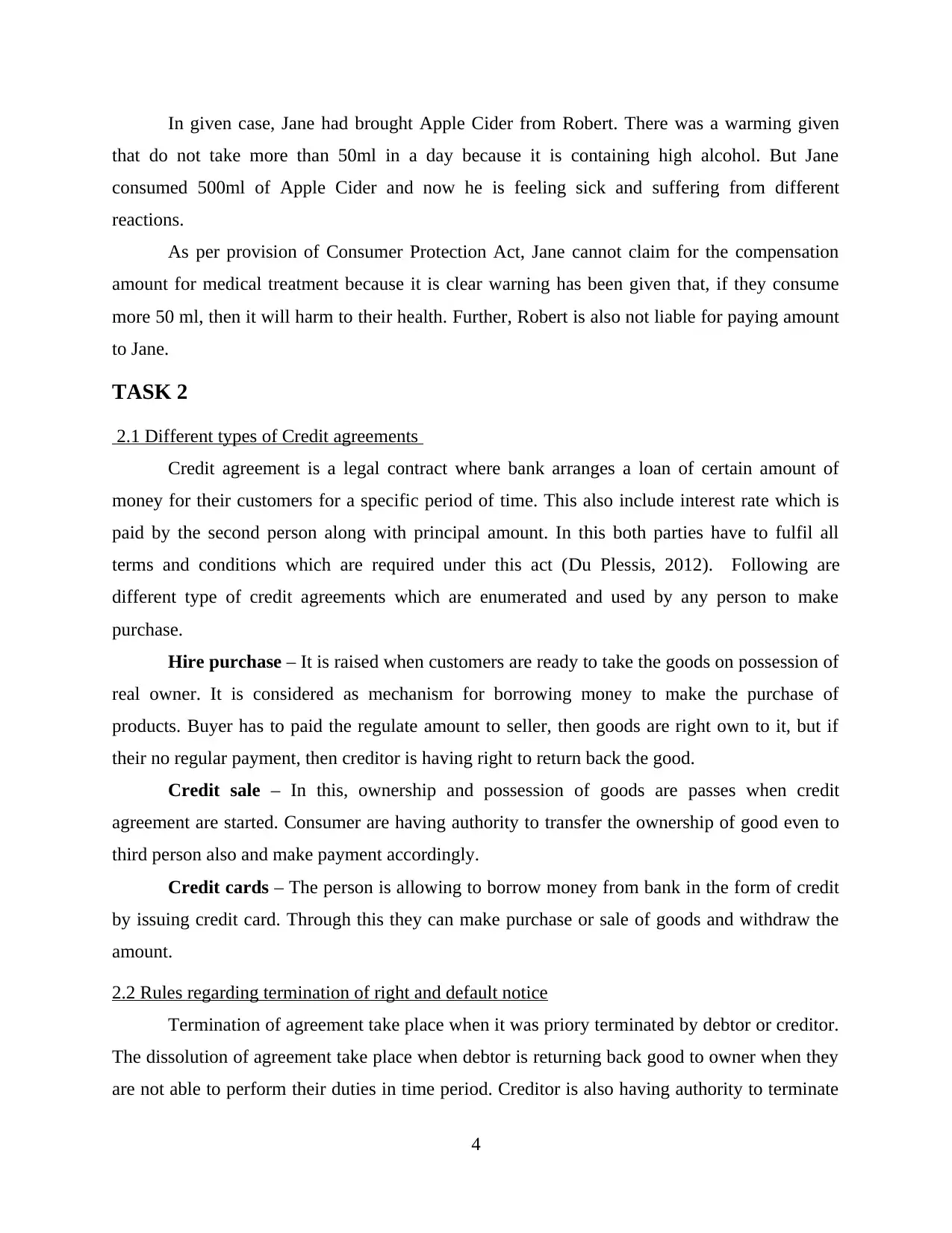
In given case, Jane had brought Apple Cider from Robert. There was a warming given
that do not take more than 50ml in a day because it is containing high alcohol. But Jane
consumed 500ml of Apple Cider and now he is feeling sick and suffering from different
reactions.
As per provision of Consumer Protection Act, Jane cannot claim for the compensation
amount for medical treatment because it is clear warning has been given that, if they consume
more 50 ml, then it will harm to their health. Further, Robert is also not liable for paying amount
to Jane.
TASK 2
2.1 Different types of Credit agreements
Credit agreement is a legal contract where bank arranges a loan of certain amount of
money for their customers for a specific period of time. This also include interest rate which is
paid by the second person along with principal amount. In this both parties have to fulfil all
terms and conditions which are required under this act (Du Plessis, 2012). Following are
different type of credit agreements which are enumerated and used by any person to make
purchase.
Hire purchase – It is raised when customers are ready to take the goods on possession of
real owner. It is considered as mechanism for borrowing money to make the purchase of
products. Buyer has to paid the regulate amount to seller, then goods are right own to it, but if
their no regular payment, then creditor is having right to return back the good.
Credit sale – In this, ownership and possession of goods are passes when credit
agreement are started. Consumer are having authority to transfer the ownership of good even to
third person also and make payment accordingly.
Credit cards – The person is allowing to borrow money from bank in the form of credit
by issuing credit card. Through this they can make purchase or sale of goods and withdraw the
amount.
2.2 Rules regarding termination of right and default notice
Termination of agreement take place when it was priory terminated by debtor or creditor.
The dissolution of agreement take place when debtor is returning back good to owner when they
are not able to perform their duties in time period. Creditor is also having authority to terminate
4
that do not take more than 50ml in a day because it is containing high alcohol. But Jane
consumed 500ml of Apple Cider and now he is feeling sick and suffering from different
reactions.
As per provision of Consumer Protection Act, Jane cannot claim for the compensation
amount for medical treatment because it is clear warning has been given that, if they consume
more 50 ml, then it will harm to their health. Further, Robert is also not liable for paying amount
to Jane.
TASK 2
2.1 Different types of Credit agreements
Credit agreement is a legal contract where bank arranges a loan of certain amount of
money for their customers for a specific period of time. This also include interest rate which is
paid by the second person along with principal amount. In this both parties have to fulfil all
terms and conditions which are required under this act (Du Plessis, 2012). Following are
different type of credit agreements which are enumerated and used by any person to make
purchase.
Hire purchase – It is raised when customers are ready to take the goods on possession of
real owner. It is considered as mechanism for borrowing money to make the purchase of
products. Buyer has to paid the regulate amount to seller, then goods are right own to it, but if
their no regular payment, then creditor is having right to return back the good.
Credit sale – In this, ownership and possession of goods are passes when credit
agreement are started. Consumer are having authority to transfer the ownership of good even to
third person also and make payment accordingly.
Credit cards – The person is allowing to borrow money from bank in the form of credit
by issuing credit card. Through this they can make purchase or sale of goods and withdraw the
amount.
2.2 Rules regarding termination of right and default notice
Termination of agreement take place when it was priory terminated by debtor or creditor.
The dissolution of agreement take place when debtor is returning back good to owner when they
are not able to perform their duties in time period. Creditor is also having authority to terminate
4
⊘ This is a preview!⊘
Do you want full access?
Subscribe today to unlock all pages.

Trusted by 1+ million students worldwide
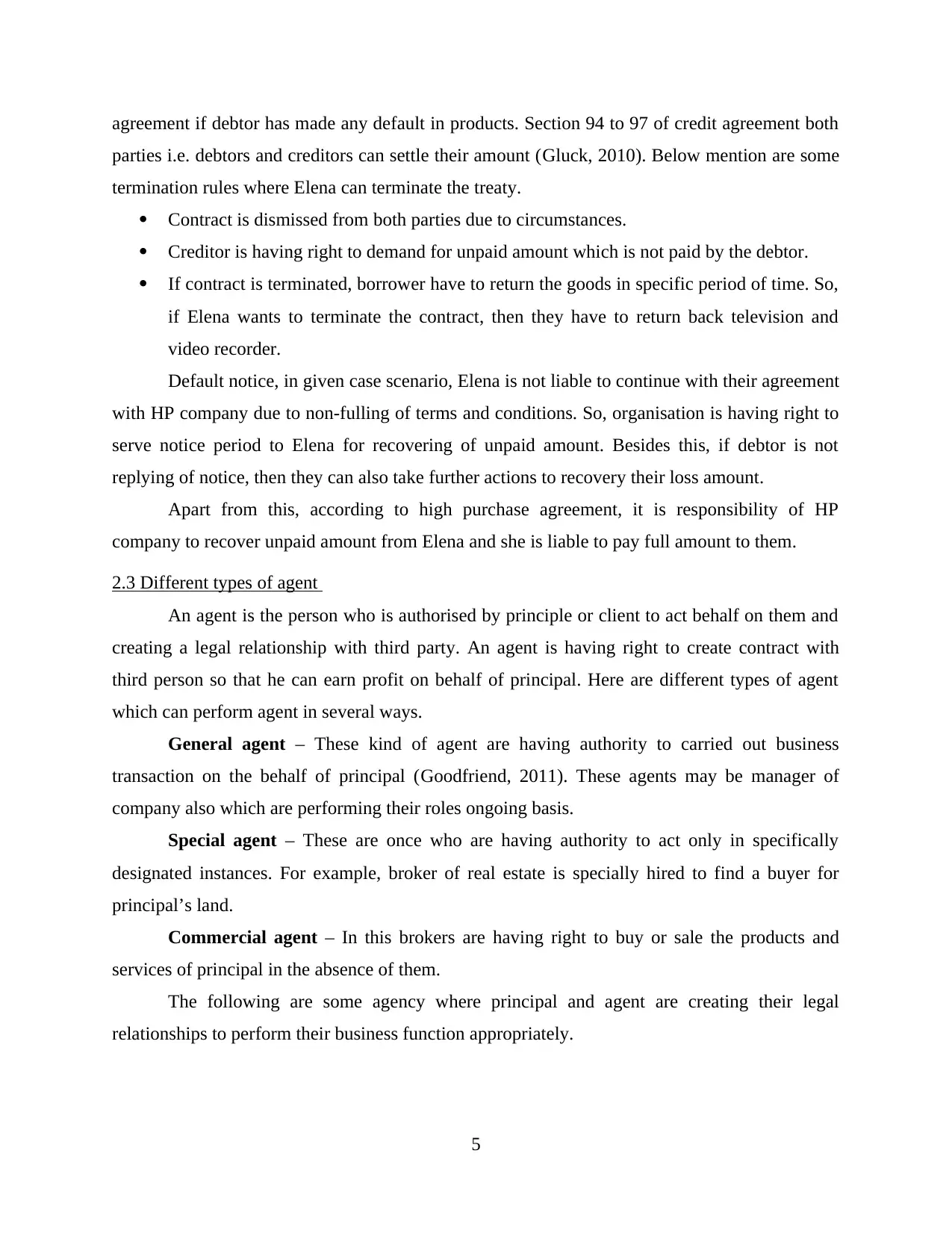
agreement if debtor has made any default in products. Section 94 to 97 of credit agreement both
parties i.e. debtors and creditors can settle their amount (Gluck, 2010). Below mention are some
termination rules where Elena can terminate the treaty.
Contract is dismissed from both parties due to circumstances.
Creditor is having right to demand for unpaid amount which is not paid by the debtor.
If contract is terminated, borrower have to return the goods in specific period of time. So,
if Elena wants to terminate the contract, then they have to return back television and
video recorder.
Default notice, in given case scenario, Elena is not liable to continue with their agreement
with HP company due to non-fulling of terms and conditions. So, organisation is having right to
serve notice period to Elena for recovering of unpaid amount. Besides this, if debtor is not
replying of notice, then they can also take further actions to recovery their loss amount.
Apart from this, according to high purchase agreement, it is responsibility of HP
company to recover unpaid amount from Elena and she is liable to pay full amount to them.
2.3 Different types of agent
An agent is the person who is authorised by principle or client to act behalf on them and
creating a legal relationship with third party. An agent is having right to create contract with
third person so that he can earn profit on behalf of principal. Here are different types of agent
which can perform agent in several ways.
General agent – These kind of agent are having authority to carried out business
transaction on the behalf of principal (Goodfriend, 2011). These agents may be manager of
company also which are performing their roles ongoing basis.
Special agent – These are once who are having authority to act only in specifically
designated instances. For example, broker of real estate is specially hired to find a buyer for
principal’s land.
Commercial agent – In this brokers are having right to buy or sale the products and
services of principal in the absence of them.
The following are some agency where principal and agent are creating their legal
relationships to perform their business function appropriately.
5
parties i.e. debtors and creditors can settle their amount (Gluck, 2010). Below mention are some
termination rules where Elena can terminate the treaty.
Contract is dismissed from both parties due to circumstances.
Creditor is having right to demand for unpaid amount which is not paid by the debtor.
If contract is terminated, borrower have to return the goods in specific period of time. So,
if Elena wants to terminate the contract, then they have to return back television and
video recorder.
Default notice, in given case scenario, Elena is not liable to continue with their agreement
with HP company due to non-fulling of terms and conditions. So, organisation is having right to
serve notice period to Elena for recovering of unpaid amount. Besides this, if debtor is not
replying of notice, then they can also take further actions to recovery their loss amount.
Apart from this, according to high purchase agreement, it is responsibility of HP
company to recover unpaid amount from Elena and she is liable to pay full amount to them.
2.3 Different types of agent
An agent is the person who is authorised by principle or client to act behalf on them and
creating a legal relationship with third party. An agent is having right to create contract with
third person so that he can earn profit on behalf of principal. Here are different types of agent
which can perform agent in several ways.
General agent – These kind of agent are having authority to carried out business
transaction on the behalf of principal (Goodfriend, 2011). These agents may be manager of
company also which are performing their roles ongoing basis.
Special agent – These are once who are having authority to act only in specifically
designated instances. For example, broker of real estate is specially hired to find a buyer for
principal’s land.
Commercial agent – In this brokers are having right to buy or sale the products and
services of principal in the absence of them.
The following are some agency where principal and agent are creating their legal
relationships to perform their business function appropriately.
5
Paraphrase This Document
Need a fresh take? Get an instant paraphrase of this document with our AI Paraphraser
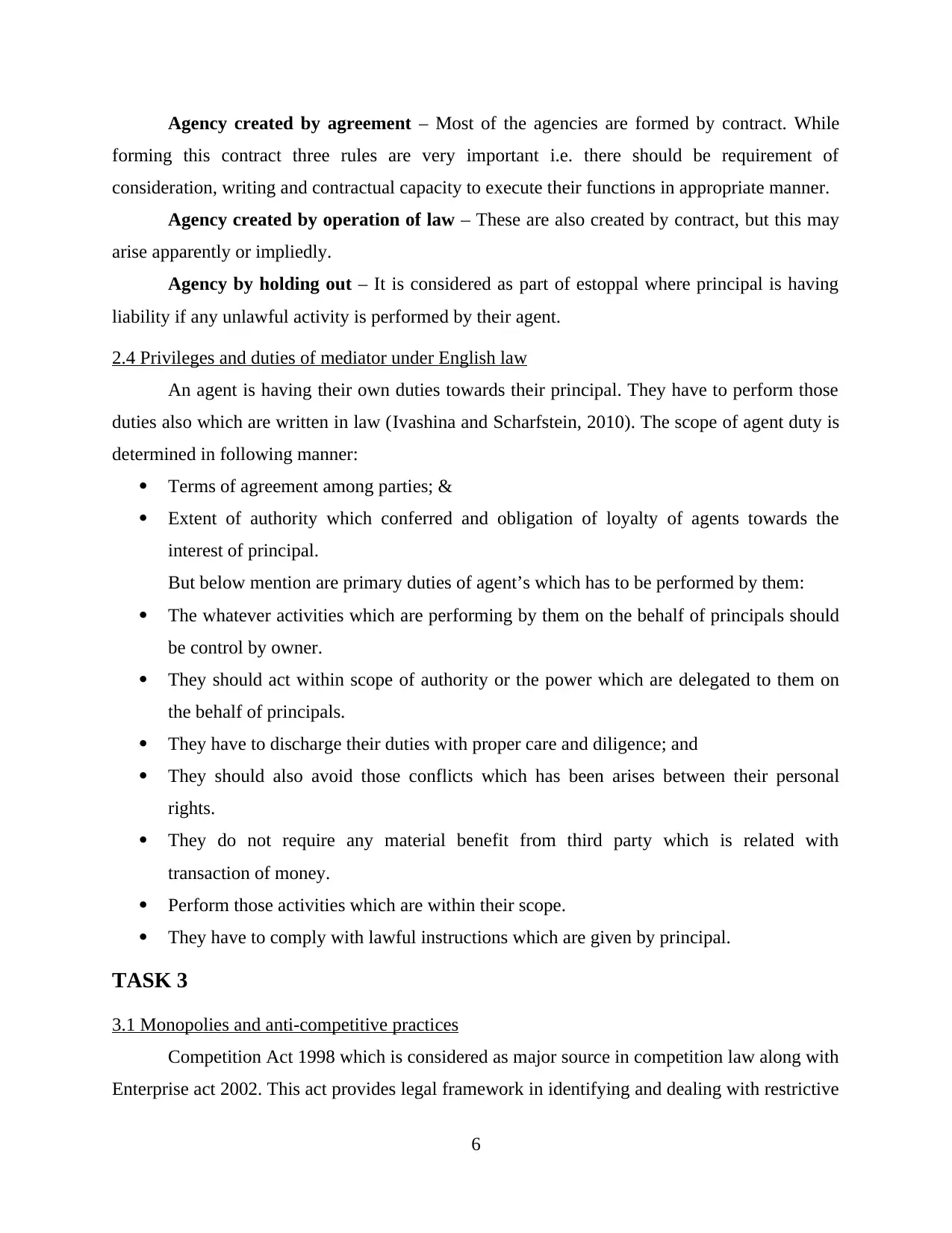
Agency created by agreement – Most of the agencies are formed by contract. While
forming this contract three rules are very important i.e. there should be requirement of
consideration, writing and contractual capacity to execute their functions in appropriate manner.
Agency created by operation of law – These are also created by contract, but this may
arise apparently or impliedly.
Agency by holding out – It is considered as part of estoppal where principal is having
liability if any unlawful activity is performed by their agent.
2.4 Privileges and duties of mediator under English law
An agent is having their own duties towards their principal. They have to perform those
duties also which are written in law (Ivashina and Scharfstein, 2010). The scope of agent duty is
determined in following manner:
Terms of agreement among parties; &
Extent of authority which conferred and obligation of loyalty of agents towards the
interest of principal.
But below mention are primary duties of agent’s which has to be performed by them:
The whatever activities which are performing by them on the behalf of principals should
be control by owner.
They should act within scope of authority or the power which are delegated to them on
the behalf of principals.
They have to discharge their duties with proper care and diligence; and
They should also avoid those conflicts which has been arises between their personal
rights.
They do not require any material benefit from third party which is related with
transaction of money.
Perform those activities which are within their scope.
They have to comply with lawful instructions which are given by principal.
TASK 3
3.1 Monopolies and anti-competitive practices
Competition Act 1998 which is considered as major source in competition law along with
Enterprise act 2002. This act provides legal framework in identifying and dealing with restrictive
6
forming this contract three rules are very important i.e. there should be requirement of
consideration, writing and contractual capacity to execute their functions in appropriate manner.
Agency created by operation of law – These are also created by contract, but this may
arise apparently or impliedly.
Agency by holding out – It is considered as part of estoppal where principal is having
liability if any unlawful activity is performed by their agent.
2.4 Privileges and duties of mediator under English law
An agent is having their own duties towards their principal. They have to perform those
duties also which are written in law (Ivashina and Scharfstein, 2010). The scope of agent duty is
determined in following manner:
Terms of agreement among parties; &
Extent of authority which conferred and obligation of loyalty of agents towards the
interest of principal.
But below mention are primary duties of agent’s which has to be performed by them:
The whatever activities which are performing by them on the behalf of principals should
be control by owner.
They should act within scope of authority or the power which are delegated to them on
the behalf of principals.
They have to discharge their duties with proper care and diligence; and
They should also avoid those conflicts which has been arises between their personal
rights.
They do not require any material benefit from third party which is related with
transaction of money.
Perform those activities which are within their scope.
They have to comply with lawful instructions which are given by principal.
TASK 3
3.1 Monopolies and anti-competitive practices
Competition Act 1998 which is considered as major source in competition law along with
Enterprise act 2002. This act provides legal framework in identifying and dealing with restrictive
6
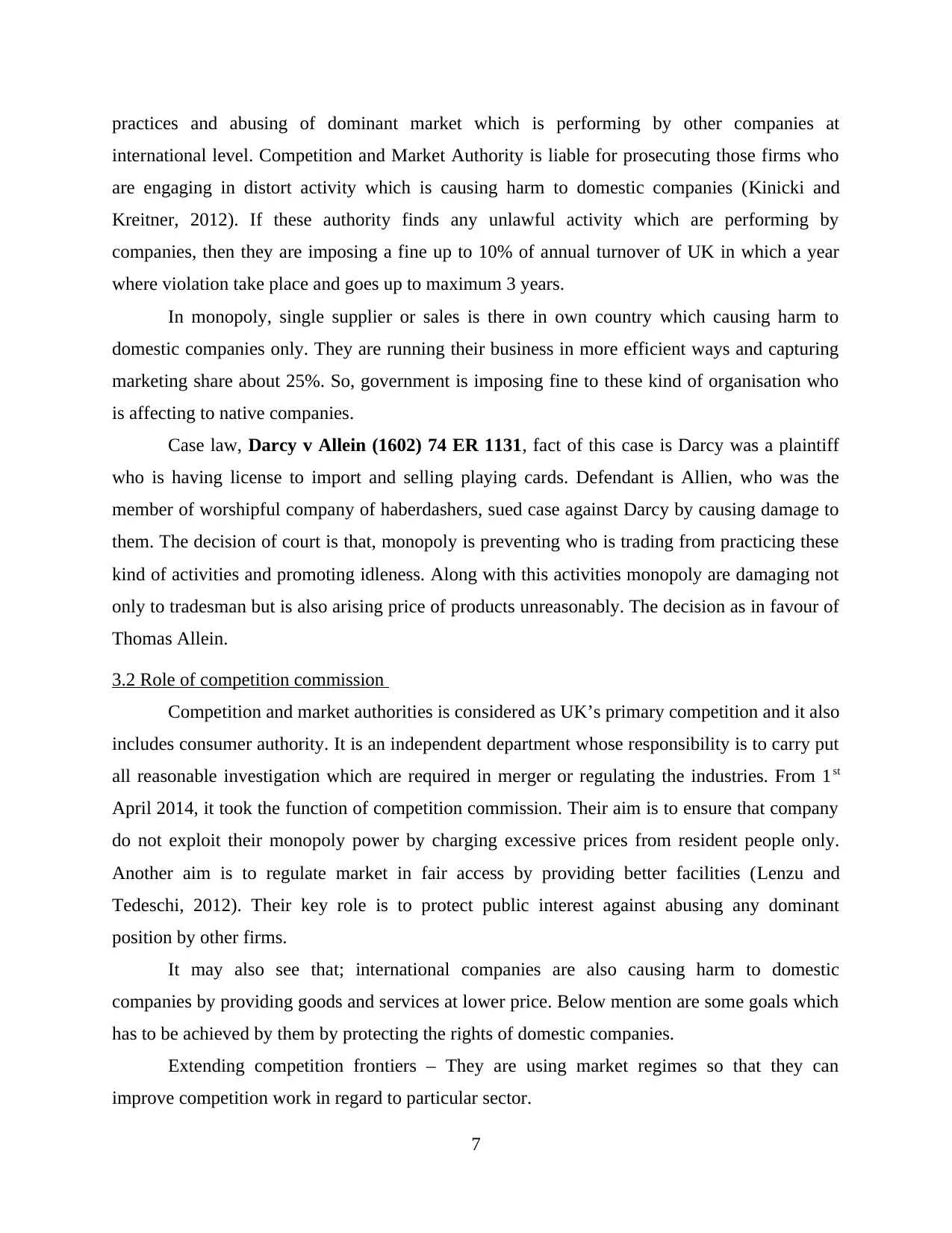
practices and abusing of dominant market which is performing by other companies at
international level. Competition and Market Authority is liable for prosecuting those firms who
are engaging in distort activity which is causing harm to domestic companies (Kinicki and
Kreitner, 2012). If these authority finds any unlawful activity which are performing by
companies, then they are imposing a fine up to 10% of annual turnover of UK in which a year
where violation take place and goes up to maximum 3 years.
In monopoly, single supplier or sales is there in own country which causing harm to
domestic companies only. They are running their business in more efficient ways and capturing
marketing share about 25%. So, government is imposing fine to these kind of organisation who
is affecting to native companies.
Case law, Darcy v Allein (1602) 74 ER 1131, fact of this case is Darcy was a plaintiff
who is having license to import and selling playing cards. Defendant is Allien, who was the
member of worshipful company of haberdashers, sued case against Darcy by causing damage to
them. The decision of court is that, monopoly is preventing who is trading from practicing these
kind of activities and promoting idleness. Along with this activities monopoly are damaging not
only to tradesman but is also arising price of products unreasonably. The decision as in favour of
Thomas Allein.
3.2 Role of competition commission
Competition and market authorities is considered as UK’s primary competition and it also
includes consumer authority. It is an independent department whose responsibility is to carry put
all reasonable investigation which are required in merger or regulating the industries. From 1st
April 2014, it took the function of competition commission. Their aim is to ensure that company
do not exploit their monopoly power by charging excessive prices from resident people only.
Another aim is to regulate market in fair access by providing better facilities (Lenzu and
Tedeschi, 2012). Their key role is to protect public interest against abusing any dominant
position by other firms.
It may also see that; international companies are also causing harm to domestic
companies by providing goods and services at lower price. Below mention are some goals which
has to be achieved by them by protecting the rights of domestic companies.
Extending competition frontiers – They are using market regimes so that they can
improve competition work in regard to particular sector.
7
international level. Competition and Market Authority is liable for prosecuting those firms who
are engaging in distort activity which is causing harm to domestic companies (Kinicki and
Kreitner, 2012). If these authority finds any unlawful activity which are performing by
companies, then they are imposing a fine up to 10% of annual turnover of UK in which a year
where violation take place and goes up to maximum 3 years.
In monopoly, single supplier or sales is there in own country which causing harm to
domestic companies only. They are running their business in more efficient ways and capturing
marketing share about 25%. So, government is imposing fine to these kind of organisation who
is affecting to native companies.
Case law, Darcy v Allein (1602) 74 ER 1131, fact of this case is Darcy was a plaintiff
who is having license to import and selling playing cards. Defendant is Allien, who was the
member of worshipful company of haberdashers, sued case against Darcy by causing damage to
them. The decision of court is that, monopoly is preventing who is trading from practicing these
kind of activities and promoting idleness. Along with this activities monopoly are damaging not
only to tradesman but is also arising price of products unreasonably. The decision as in favour of
Thomas Allein.
3.2 Role of competition commission
Competition and market authorities is considered as UK’s primary competition and it also
includes consumer authority. It is an independent department whose responsibility is to carry put
all reasonable investigation which are required in merger or regulating the industries. From 1st
April 2014, it took the function of competition commission. Their aim is to ensure that company
do not exploit their monopoly power by charging excessive prices from resident people only.
Another aim is to regulate market in fair access by providing better facilities (Lenzu and
Tedeschi, 2012). Their key role is to protect public interest against abusing any dominant
position by other firms.
It may also see that; international companies are also causing harm to domestic
companies by providing goods and services at lower price. Below mention are some goals which
has to be achieved by them by protecting the rights of domestic companies.
Extending competition frontiers – They are using market regimes so that they can
improve competition work in regard to particular sector.
7
⊘ This is a preview!⊘
Do you want full access?
Subscribe today to unlock all pages.

Trusted by 1+ million students worldwide
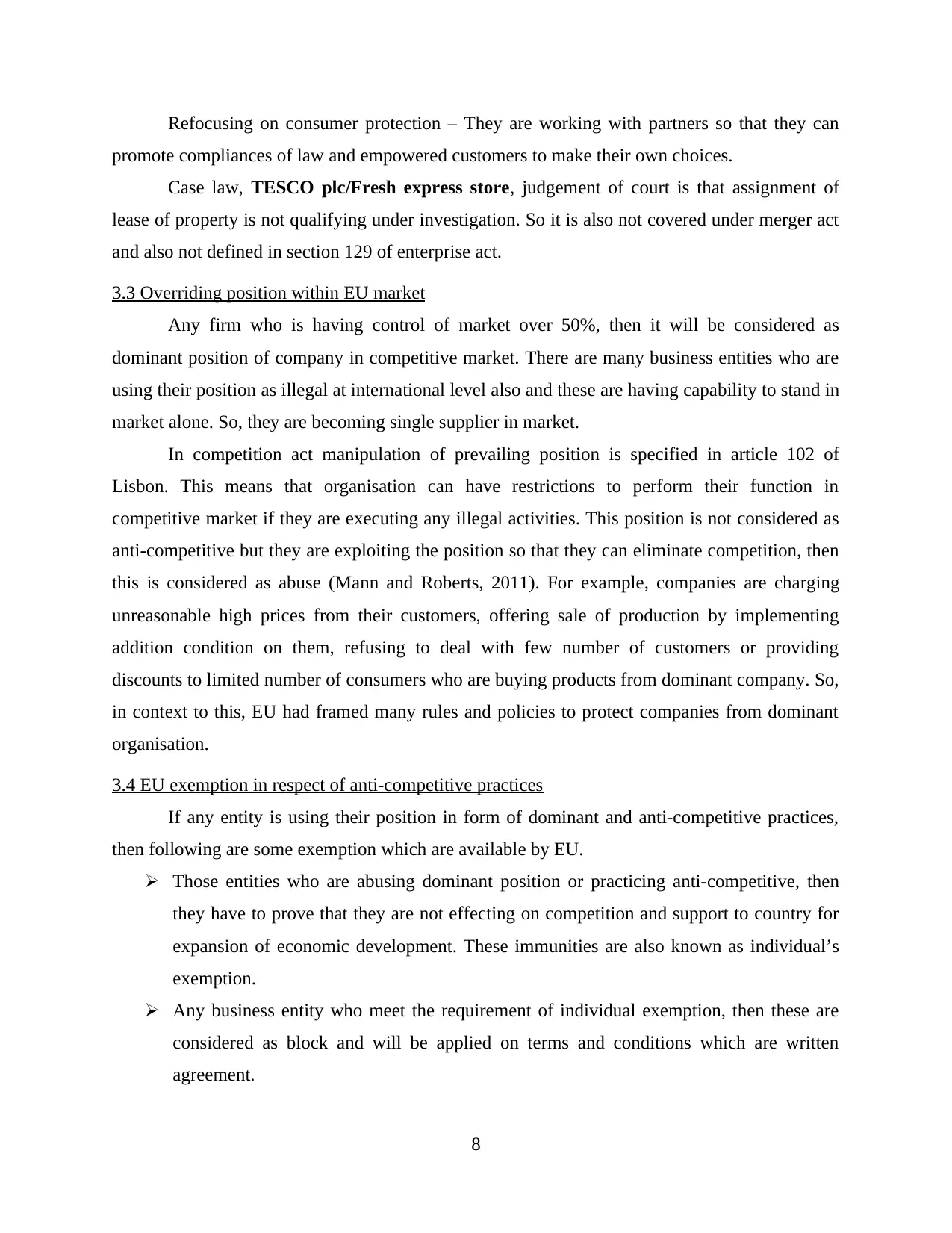
Refocusing on consumer protection – They are working with partners so that they can
promote compliances of law and empowered customers to make their own choices.
Case law, TESCO plc/Fresh express store, judgement of court is that assignment of
lease of property is not qualifying under investigation. So it is also not covered under merger act
and also not defined in section 129 of enterprise act.
3.3 Overriding position within EU market
Any firm who is having control of market over 50%, then it will be considered as
dominant position of company in competitive market. There are many business entities who are
using their position as illegal at international level also and these are having capability to stand in
market alone. So, they are becoming single supplier in market.
In competition act manipulation of prevailing position is specified in article 102 of
Lisbon. This means that organisation can have restrictions to perform their function in
competitive market if they are executing any illegal activities. This position is not considered as
anti-competitive but they are exploiting the position so that they can eliminate competition, then
this is considered as abuse (Mann and Roberts, 2011). For example, companies are charging
unreasonable high prices from their customers, offering sale of production by implementing
addition condition on them, refusing to deal with few number of customers or providing
discounts to limited number of consumers who are buying products from dominant company. So,
in context to this, EU had framed many rules and policies to protect companies from dominant
organisation.
3.4 EU exemption in respect of anti-competitive practices
If any entity is using their position in form of dominant and anti-competitive practices,
then following are some exemption which are available by EU.
Those entities who are abusing dominant position or practicing anti-competitive, then
they have to prove that they are not effecting on competition and support to country for
expansion of economic development. These immunities are also known as individual’s
exemption.
Any business entity who meet the requirement of individual exemption, then these are
considered as block and will be applied on terms and conditions which are written
agreement.
8
promote compliances of law and empowered customers to make their own choices.
Case law, TESCO plc/Fresh express store, judgement of court is that assignment of
lease of property is not qualifying under investigation. So it is also not covered under merger act
and also not defined in section 129 of enterprise act.
3.3 Overriding position within EU market
Any firm who is having control of market over 50%, then it will be considered as
dominant position of company in competitive market. There are many business entities who are
using their position as illegal at international level also and these are having capability to stand in
market alone. So, they are becoming single supplier in market.
In competition act manipulation of prevailing position is specified in article 102 of
Lisbon. This means that organisation can have restrictions to perform their function in
competitive market if they are executing any illegal activities. This position is not considered as
anti-competitive but they are exploiting the position so that they can eliminate competition, then
this is considered as abuse (Mann and Roberts, 2011). For example, companies are charging
unreasonable high prices from their customers, offering sale of production by implementing
addition condition on them, refusing to deal with few number of customers or providing
discounts to limited number of consumers who are buying products from dominant company. So,
in context to this, EU had framed many rules and policies to protect companies from dominant
organisation.
3.4 EU exemption in respect of anti-competitive practices
If any entity is using their position in form of dominant and anti-competitive practices,
then following are some exemption which are available by EU.
Those entities who are abusing dominant position or practicing anti-competitive, then
they have to prove that they are not effecting on competition and support to country for
expansion of economic development. These immunities are also known as individual’s
exemption.
Any business entity who meet the requirement of individual exemption, then these are
considered as block and will be applied on terms and conditions which are written
agreement.
8
Paraphrase This Document
Need a fresh take? Get an instant paraphrase of this document with our AI Paraphraser
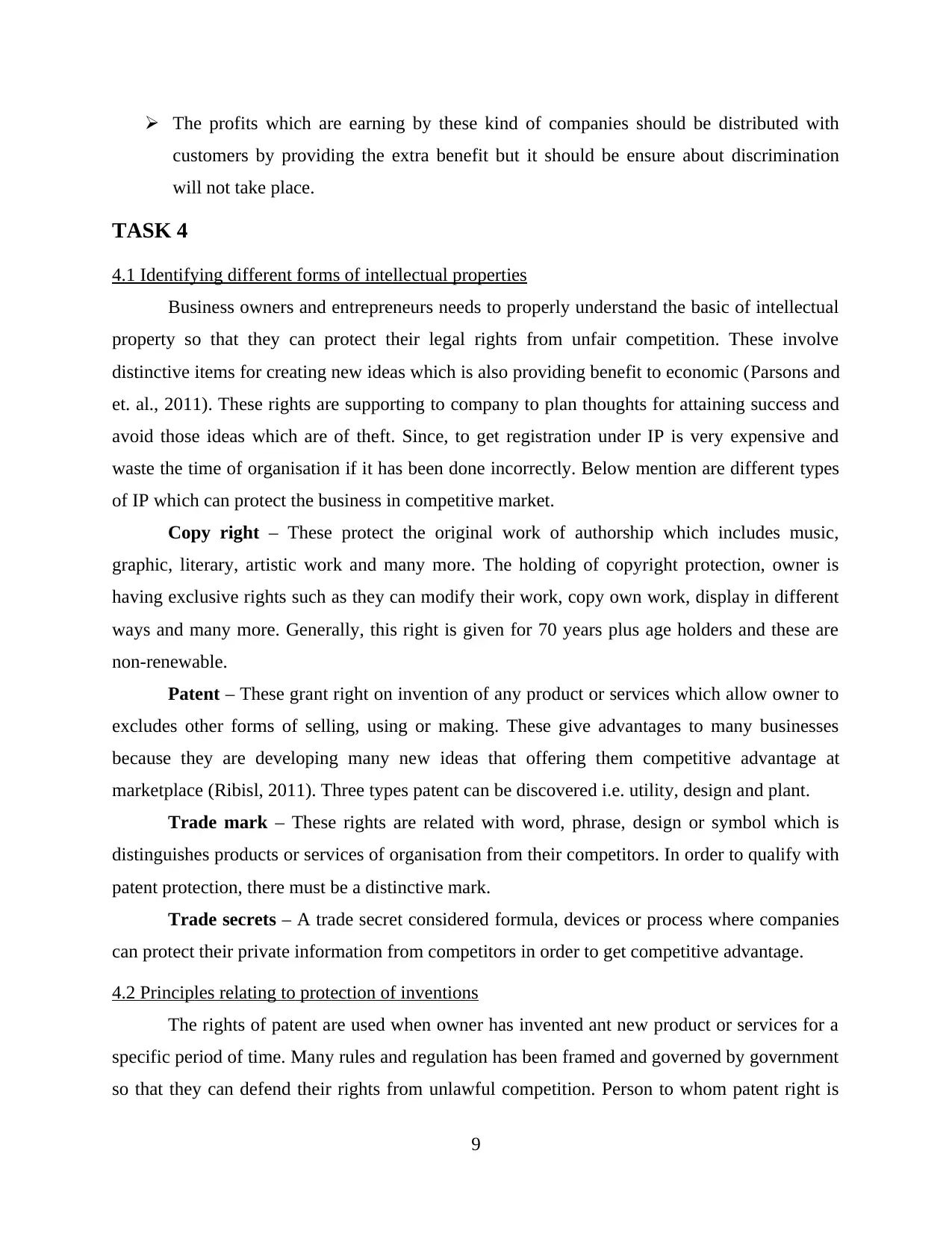
The profits which are earning by these kind of companies should be distributed with
customers by providing the extra benefit but it should be ensure about discrimination
will not take place.
TASK 4
4.1 Identifying different forms of intellectual properties
Business owners and entrepreneurs needs to properly understand the basic of intellectual
property so that they can protect their legal rights from unfair competition. These involve
distinctive items for creating new ideas which is also providing benefit to economic (Parsons and
et. al., 2011). These rights are supporting to company to plan thoughts for attaining success and
avoid those ideas which are of theft. Since, to get registration under IP is very expensive and
waste the time of organisation if it has been done incorrectly. Below mention are different types
of IP which can protect the business in competitive market.
Copy right – These protect the original work of authorship which includes music,
graphic, literary, artistic work and many more. The holding of copyright protection, owner is
having exclusive rights such as they can modify their work, copy own work, display in different
ways and many more. Generally, this right is given for 70 years plus age holders and these are
non-renewable.
Patent – These grant right on invention of any product or services which allow owner to
excludes other forms of selling, using or making. These give advantages to many businesses
because they are developing many new ideas that offering them competitive advantage at
marketplace (Ribisl, 2011). Three types patent can be discovered i.e. utility, design and plant.
Trade mark – These rights are related with word, phrase, design or symbol which is
distinguishes products or services of organisation from their competitors. In order to qualify with
patent protection, there must be a distinctive mark.
Trade secrets – A trade secret considered formula, devices or process where companies
can protect their private information from competitors in order to get competitive advantage.
4.2 Principles relating to protection of inventions
The rights of patent are used when owner has invented ant new product or services for a
specific period of time. Many rules and regulation has been framed and governed by government
so that they can defend their rights from unlawful competition. Person to whom patent right is
9
customers by providing the extra benefit but it should be ensure about discrimination
will not take place.
TASK 4
4.1 Identifying different forms of intellectual properties
Business owners and entrepreneurs needs to properly understand the basic of intellectual
property so that they can protect their legal rights from unfair competition. These involve
distinctive items for creating new ideas which is also providing benefit to economic (Parsons and
et. al., 2011). These rights are supporting to company to plan thoughts for attaining success and
avoid those ideas which are of theft. Since, to get registration under IP is very expensive and
waste the time of organisation if it has been done incorrectly. Below mention are different types
of IP which can protect the business in competitive market.
Copy right – These protect the original work of authorship which includes music,
graphic, literary, artistic work and many more. The holding of copyright protection, owner is
having exclusive rights such as they can modify their work, copy own work, display in different
ways and many more. Generally, this right is given for 70 years plus age holders and these are
non-renewable.
Patent – These grant right on invention of any product or services which allow owner to
excludes other forms of selling, using or making. These give advantages to many businesses
because they are developing many new ideas that offering them competitive advantage at
marketplace (Ribisl, 2011). Three types patent can be discovered i.e. utility, design and plant.
Trade mark – These rights are related with word, phrase, design or symbol which is
distinguishes products or services of organisation from their competitors. In order to qualify with
patent protection, there must be a distinctive mark.
Trade secrets – A trade secret considered formula, devices or process where companies
can protect their private information from competitors in order to get competitive advantage.
4.2 Principles relating to protection of inventions
The rights of patent are used when owner has invented ant new product or services for a
specific period of time. Many rules and regulation has been framed and governed by government
so that they can defend their rights from unlawful competition. Person to whom patent right is
9
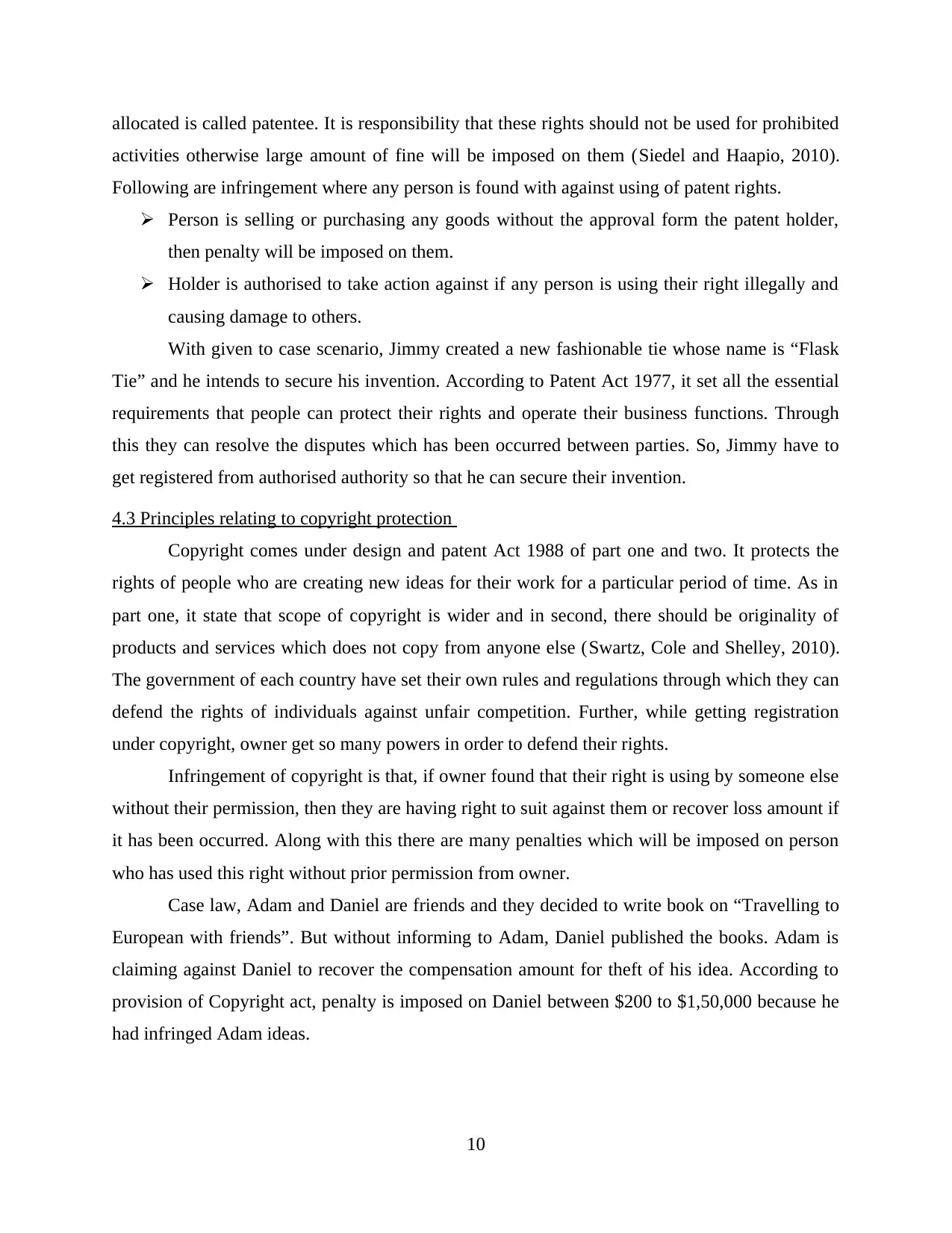
allocated is called patentee. It is responsibility that these rights should not be used for prohibited
activities otherwise large amount of fine will be imposed on them (Siedel and Haapio, 2010).
Following are infringement where any person is found with against using of patent rights.
Person is selling or purchasing any goods without the approval form the patent holder,
then penalty will be imposed on them.
Holder is authorised to take action against if any person is using their right illegally and
causing damage to others.
With given to case scenario, Jimmy created a new fashionable tie whose name is “Flask
Tie” and he intends to secure his invention. According to Patent Act 1977, it set all the essential
requirements that people can protect their rights and operate their business functions. Through
this they can resolve the disputes which has been occurred between parties. So, Jimmy have to
get registered from authorised authority so that he can secure their invention.
4.3 Principles relating to copyright protection
Copyright comes under design and patent Act 1988 of part one and two. It protects the
rights of people who are creating new ideas for their work for a particular period of time. As in
part one, it state that scope of copyright is wider and in second, there should be originality of
products and services which does not copy from anyone else (Swartz, Cole and Shelley, 2010).
The government of each country have set their own rules and regulations through which they can
defend the rights of individuals against unfair competition. Further, while getting registration
under copyright, owner get so many powers in order to defend their rights.
Infringement of copyright is that, if owner found that their right is using by someone else
without their permission, then they are having right to suit against them or recover loss amount if
it has been occurred. Along with this there are many penalties which will be imposed on person
who has used this right without prior permission from owner.
Case law, Adam and Daniel are friends and they decided to write book on “Travelling to
European with friends”. But without informing to Adam, Daniel published the books. Adam is
claiming against Daniel to recover the compensation amount for theft of his idea. According to
provision of Copyright act, penalty is imposed on Daniel between $200 to $1,50,000 because he
had infringed Adam ideas.
10
activities otherwise large amount of fine will be imposed on them (Siedel and Haapio, 2010).
Following are infringement where any person is found with against using of patent rights.
Person is selling or purchasing any goods without the approval form the patent holder,
then penalty will be imposed on them.
Holder is authorised to take action against if any person is using their right illegally and
causing damage to others.
With given to case scenario, Jimmy created a new fashionable tie whose name is “Flask
Tie” and he intends to secure his invention. According to Patent Act 1977, it set all the essential
requirements that people can protect their rights and operate their business functions. Through
this they can resolve the disputes which has been occurred between parties. So, Jimmy have to
get registered from authorised authority so that he can secure their invention.
4.3 Principles relating to copyright protection
Copyright comes under design and patent Act 1988 of part one and two. It protects the
rights of people who are creating new ideas for their work for a particular period of time. As in
part one, it state that scope of copyright is wider and in second, there should be originality of
products and services which does not copy from anyone else (Swartz, Cole and Shelley, 2010).
The government of each country have set their own rules and regulations through which they can
defend the rights of individuals against unfair competition. Further, while getting registration
under copyright, owner get so many powers in order to defend their rights.
Infringement of copyright is that, if owner found that their right is using by someone else
without their permission, then they are having right to suit against them or recover loss amount if
it has been occurred. Along with this there are many penalties which will be imposed on person
who has used this right without prior permission from owner.
Case law, Adam and Daniel are friends and they decided to write book on “Travelling to
European with friends”. But without informing to Adam, Daniel published the books. Adam is
claiming against Daniel to recover the compensation amount for theft of his idea. According to
provision of Copyright act, penalty is imposed on Daniel between $200 to $1,50,000 because he
had infringed Adam ideas.
10
⊘ This is a preview!⊘
Do you want full access?
Subscribe today to unlock all pages.

Trusted by 1+ million students worldwide
1 out of 15
Related Documents
Your All-in-One AI-Powered Toolkit for Academic Success.
+13062052269
info@desklib.com
Available 24*7 on WhatsApp / Email
![[object Object]](/_next/static/media/star-bottom.7253800d.svg)
Unlock your academic potential
Copyright © 2020–2025 A2Z Services. All Rights Reserved. Developed and managed by ZUCOL.





